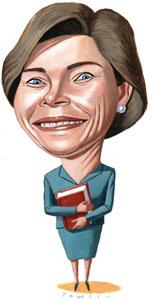Laura Bush, as prim as she seems, has always been something of a pinup girl for the left. We can’t help it: We fantasize about her. Where conservatives see a demure Texan homemaker, we’re sure she’s a closet liberal, sensible and smart. Like lovesick teens, we pay undue attention to her most insignificant utterances. (One time, she refused to say what she thought about the death penalty. She’s probably against it, just like us!) Shared interests seem to offer proof of some ultimate compatibility. (A librarian who loves reading! Doesn’t she see? We love reading, too!) We’ve fooled ourselves into believing that she’s too smart for her husband, that she’s tormented by his brutish policies, that she’s a dulcet voice of reason, whispering moderate nothings into the president’s ear. But as George W. Bush’s re-election campaign rolls onward, the truth becomes increasingly clear: Our fantasies are just that—fantasy. Laura isn’t the woman we thought she was. We’ve got to stop seeing her like this.
Laura’s liberal apologists shouldn’t be too hard on themselves. Almost everybody loves Laura—a recent poll showed that a scant 12 percent of voters have an unfavorable view of her. The Bush folks, well aware of the first lady’s appeal to people who aren’t sold on her husband, plan her campaign activities accordingly. In 2000, Laura was presented as the ballast in the president’s hot air balloon. She was the reason he quit boozing, and she seemed to embody the compassion he said would mark his conservatism. She also managed to present herself as more liberal than her husband, as when she confessed just after the election that she supported Roe v. Wade. It was never clear whether this was an amateur slip by a woman unused to the pressures of the national stage or a canny maneuver by a woman who’d watched her mother-in-law execute similar straddles. But it left many people with the hope that Laura was more liberal than she let on.
Laura has done more touring on her own this year. In August alone, she was sent to Michigan, Ohio, Pennsylvania, Wisconsin, and several other swing states. She’s a money machine: She has drummed up more than $10 million at fund-raisers this year. Voters see her as trustworthy and apolitical, so the campaign counts on her to explain her husband’s policies in terms that seem to make sense. When the Kerry camp began to critique Bush’s position on stem-cell research, it was Laura who called the attack “ridiculous”; her husband, she explained, was “the only president to ever authorize federal funding for embryonic stem-cell research.” (Never mind that he authorized a uselessly tiny amount.) When asked in the days that followed whether she is now pro-life, she said: “Yes, I think abortion should be rare.”
It’s another straddle, and her willingness to strike such disparate poses reveals just how flimsy the case for Laura’s liberalism always was. Take, for example, the reading thing. Liberals can’t seem to get over the fact that Laura Bush is a woman of letters. In a recent Vanity Fair profile of the Bush women, James Wolcott demonstrated how easy it is to be wooed by the first lady’s reading habits—”I took an instant shine to her when I read that one of her favorite writers was Katherine Anne Porter”—and how tempting it is to extrapolate from them—”A man who would marry a woman this kind and refined couldn’t be all boor, could he?” More than one commentator has noted with approval and some surprise that Laura Bush’s favorite scene in literature is the “Grand Inquisitor” portion of The Brothers Karamazov, and the playwright Tony Kushner used this remarkable tidbit as the basis for an entire play. (In it, a syrupy, conflicted Laura Bush reads Dostoevsky to dead Iraqi children and defends her husband’s policies to an angel standing nearby.)
But this fascination with Laura’s reading habits reveals more about what liberals think of reading than about Laura herself. The figure of the reader is everything liberals think President Bush is not: curious, reflective, intelligent, intrigued by words. When liberals note that Laura is a reader, they mean that she must be a sort of anti-Dubya. And when they hear her standing by Bush in the stem-cell debate, they wonder how a reader—someone devoted to the pursuit of knowledge—could possibly stick up for a policy designed to thwart those who seek it.
This is an intriguing question, but a fruitless one. In the end, all we really need to know about Laura is that she does stick up for her husband—for his stem-cell policy, for his economic policy, for his war. When she addresses the American public tonight, the former librarian may even stick up for his education policy, even though education journals she is no doubt familiar with heatedly debate the merits of No Child Left Behind and suggest that her husband has inadequately funded it. The last four years have made one thing clear: Laura Bush is not a liberal’s best friend in the White House. And if—as the Bush camp seems to think—the first lady is the one who can best persuade moderate voters to re-elect her husband, she will prove herself to be no friend to liberals at all.
